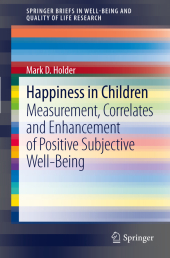 Neuerscheinungen 2012Stand: 2020-01-07 |
Schnellsuche
ISBN/Stichwort/Autor
|
Herderstraße 10
10625 Berlin
Tel.: 030 315 714 16
Fax 030 315 714 14
info@buchspektrum.de |

Mark D. Holder
Happiness in Children
Measurement, Correlates and Enhancement of Positive Subjective Well-Being
2012. xi, 87 S. 235 mm
Verlag/Jahr: SPRINGER NETHERLANDS 2012
ISBN: 9400744137 (9400744137)
Neue ISBN: 978-9400744134 (9789400744134)
Preis und Lieferzeit: Bitte klicken
This briefs summarizes the research on positive well-being in children, with a particular focus on their happiness. It starts with a discussion of the constructs of positive psychology (i.e., well-being, happiness and life satisfaction), and then outlines the research that shows the importance of studying well-being. Next, it explores how researchers measure happiness and what these measures tell us about whether children are happy and how their happiness differs from adults. Following this, it discusses current positive psychology theories with the aim of suggesting their promise in understanding childrenīs well-being. Next, it examines the importance of individual differences, including culture and temperament. Because studies have only recently identified several of the factors associated with childrenīs happiness, the book ends with a discussion of how we might enhance childrenīs well-being and suggests directions for future research.
Chapter 1. Introduction.- Chapter 2. Understanding the Construct of Positive Well-Being and Happiness.- Chapter 3. Why Study Childrenīs and Adults Well-Being, Including their Happiness.- Chapter 4. The Assessment of Happiness in Children and Adults.- Chapter 5. Predictors and Correlates of Well-Being.- Chapter 6. Similarities and Diferences: Correlations and Predictors of Positive Well-Being in Adults and Children.- Chapter 7. Application of Theory to Subjective Well-Being in Children.- Chapter 8. Individual Differences.- Chapter 9. Are Children Happy.- Chapter 10. Are Children Happy.- Chapter 11. Enhancing Childrenīs Well-Being.- Future Research.- Conclusion.- References.-


